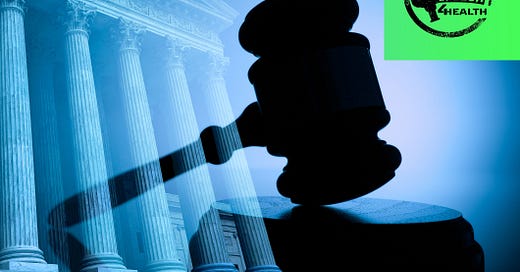US Supreme court refuses to hear pivotal online free speech case
Judges ruled 6-3 that there was insufficient evidence giving Murthy v Missouri plaintiffs standing – but it’s not over!
Last week, the US Supreme Court threw out the landmark lawsuit, Murthy v Missouri, that would have restricted the US government's multi-agency efforts to pressurise Big Social to moderate, demote or remove content it didn’t want the public to see. The court, disappointingly, ruled 6-3 that the plaintiffs, the states of Missouri and Louisiana and 5 social media users including two authors of the Great Barrington Declaration, lacked the necessary legal standing to pursue their case.
Fortunately, there are several other cases—including that of presidential candidate Robert Kennedy (RFK) Jnr— that are still live, tackling a determined agenda by the current US administration and agencies to shut down free speech. Free speech that has often been found to include truthful, factual information and wholly accurate reporting.
The inside track
Justice Amy Coney Barrett, on behalf of the majority, focused on the reasons to not give standing to the plaintiffs, saying they couldn’t establish a "concrete” or causal link between the complained restrictions and actions of government officials. She also said that a court order to block such communications probably wouldn't have any effect on moderation by social media platforms' decisions, because they’d enforce their own policies in any event.
The three dissenting judges, Justices Samuel Alito, Clarence Thomas and Neil Gorsuch, felt differently. Justice Samuel A. Alito Jr, joined by Justices Clarence Thomas and Neil M. Gorsuch, wrote in the dissenting opinion that “this is one of the most important free speech cases to reach this Court in years…For months, high-ranking government officials placed unrelenting pressure on Facebook to suppress Americans’ free speech. Because the court unjustifiably refuses to address this serious threat to the First Amendment, I respectfully dissent.”
Standing aside, pivotal to the case was whether "jawboning," where government officials informally persuade external entities to take action, did or didn’t take place. At the heart of the evidence was the Biden administration's efforts in 2021 to curb COVID-19 vaccine misinformation, claiming it infringed on free speech rights.
I previously wrote about Judge Terry Doughty’s ruling in the Louisiana district court last year that found White House officials violated the First Amendment by coercing or at least significantly encouraging social media platforms' moderation decisions, so issuing an order limiting the White House and other agencies' communications with these platforms.
The U.S. Court of Appeals for the 5th Circuit mostly upheld this ruling, leading the Biden administration to seek Supreme Court intervention. The justices suspended Doughty's order pending their review.
In its 29-page decision, the Supreme Court reversed the appeals court's ruling and kicked the case back for further proceedings. Barrett explained that for the lawsuit to proceed, plaintiffs needed to show a significant risk of future harm from government actions influencing social media restrictions. She made it clear that this would be a difficult requirement to meet.
Barrett examined specific claims made by the plaintiffs but found most were not sufficiently strong to establish the sufficient linkage for standing. Jill Hines, co-director of Louisiana Health Freedom and Stand for Health Freedom’s advocacy director, presented what was considered by the judges the strongest case. But complicating her bid for standing was Barrett’s claim that the censorship she experienced occurred before significant government communication, so weakening the argument that her restrictions resulted from government coercion.
Free speech ally Alito
On the other side, in his dissent, Alito stressed the importance of protecting speech essential to democratic self-government and advancing knowledge. He made the important point that a lot of social media communication beyond COVID-19 vaccines was suppressed, including information on COVID-19's origins, was also suppressed, this presumably included information that has a very high likelihood of being true, such as NIH’s use of American taxpayer dollars to fund gain-of-function research in China, and Fauci’s knowledge of it.
Alito believed Hines had demonstrated sufficient past and potential future injuries from government actions to give her standing and the Supreme Court’s deliberations on the case. Demonstrating apparent concern for the rise of tyranny and the administrative state, he criticised the majority for failing to protect against government control over public discourse.
It was also Justice Alito that argued for RFK Jnr’s intervention to join Murthy v Missouri as a plaintiff. More to the point, had this intervention been permitted, the judges may have been forced to give the case standing as significant evidence in the case referenced, from Twitter Files and other sources, the removal of RFK Jnr’s posts by order of high level federal officials.
The fat lady has yet to sing…
But it’s not over. This ruling is one of four expected this term concerning government and social media relationships. In March, the justices ruled on public officials' liability for blocking critics on personal social media accounts in Lindke v. Freed. The Court also heard arguments in February about laws in Texas and Florida regulating content control by large social media companies, with decisions in those cases anticipated soon.
But it’s a presidential candidate’s case, that of RFK Jnr, that likely holds most promise. We await more news and will feed back our analysis once we hear more.
Make your voice heard
Please make your voice heard by adding your name (not your contact details, we value privacy!) to the FreeSpeech4Health petition. This will help us move to the next phase by turning up with the petition at Google’s California office to force them to change YouTube’s ludicrous medical misinformation policy.





